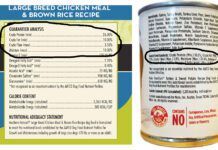When thinking about what to feed dogs, meat seems like the obvious choice. As descendants of wolves, dogs have retained many of the physical traits and digestive capabilities that make them well-suited to a diet rich in animal proteins. Yet modern dog nutrition offers a wide range of options, leaving many owners to wonder what the best option for their dog is.
It’s important to understand that dogs can eat cooked meat and, for many, it is a safe and convenient way to provide your dog with essential nutrients and a tasty treat. Cooked lean meats like chicken, turkey, beef, lamb, and pork are highly digestible and palatable for most dogs. Many home-cooked meals and commercial foods are based on cooked meat for exactly this reason.
However, it is crucial to remember that feeding plain cooked meat alone, especially just muscle cuts like chicken breast or ground beef, does not provide your dog with complete nutrition. Dogs also need essential vitamins, minerals, and fats, many of which come from bones, organs, and outside supplementation.
Best Raw Meat for Dogs
Many owners believe raw meat is best for their dogs. A properly formulated raw diet typically includes raw muscle meat, bone, organ meats such as kidney and liver, and sometimes vegetables and supplements. Advocates of raw feeding believe it mirrors what dogs’ ancestors would eat in the wild and argue that it promotes healthier skin, smaller stools, better dental health, and increased vitality.
Raw diets can offer excellent results for some dogs, especially when carefully balanced and sourced from high-quality ingredients. However, raw feeding is not without risks and challenges. Raw meat can carry bacteria that pose not only a risk to dogs, but to the humans handling the food as well, especially for children or for those with weakened immune systems. Dogs are generally more resistant to these pathogens than humans, thanks to their acidic stomach acids and short digestive tracts, however, they can still become ill or shed bacteria in their saliva or feces.
A Variety of Meat Is Key for Dogs
When it comes to choosing the best type of meat for your dog, variety is key. Both raw and cooked diets can benefit from incorporating different meats, each offering unique nutrients. For example, chicken and turkey are lean and easy to digest, beef offers high levels of zinc and iron, lamb in rich in fat-soluble vitamins, and fish, like salmon, provide omega-3 fatty acids fatty acids essential for skin and joint health.
Many dogs that have food sensitivities react poorly to chicken, turkey, lamb, and beef. For these dogs, trying meats like venison, bison, kangaroo, rabbit, and alligator may prevent negative reactions.
Is Raw or Cooked Meat Better for a Dog?
Ultimately, there is no one-size-fits-all answer to whether raw or cooked meat is better for dogs. The best approach is one that fits your dog’s health needs, your lifestyle, and your ability to consistently feed a complete and balanced diet. Some dogs thrive on balanced home-cooked meals, others do exceptionally well on raw, and many do great on commercial diets with high meat inclusions. What matters most is nutritional adequacy, food safety, and attention to your dog’s individual needs.
If you are considering a change in diet to prioritize meat, consult your veterinarian or a board-certified nutritionist to design a meal plan that ensures your dog gets everything they need to live a healthy, happy life.






